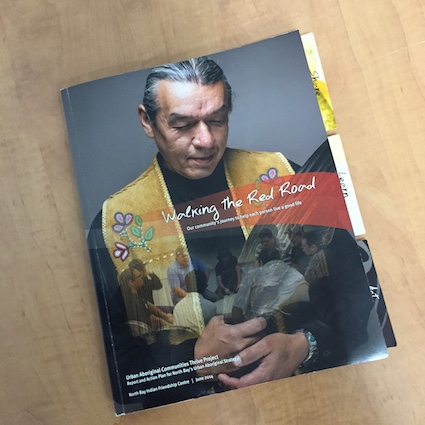Partnerships shaking history and affecting change

Dr. Katrina Srigley builds partnerships to challenge the way people work and think about the stories of our pasts. Her work, in partnership with the North Bay Indian Friendship Centre informed the provincially-mandated ten-year housing plan for the District of Nipissing and is highlighted in the Friendship Centre’s recently released publication, Walking the Red Road, a report and action plan for North Bay’s Urban Aboriginal Strategy. In 2013, Srigley, an Associate Professor of History at Nipissing University, presented to the board at the Friendship Centre, seeking a partnership to explore stories of homelessness and migration in northeastern Ontario. With board approval, Srigley and began working with Patty Chabbert, Dawn Lamothe, and other community members to listen to and explore this history using Indigenous storytelling methodologies.
The partnership is partially supported by a Social Sciences and Humanities Research Council of Canada funded Community University Research Alliance. Click here for more details.
“In powerful ways, our partnership demonstrates how relationships build respectfully and in culturally appropriate ways can unite people across institutions, communities and generations, and produce meaningful results,” said Srigley in Walking the Red Road.
You can check out Walking the Red Road, right here.
Srigley’s research is also changing the way history is taught in university and high school classrooms. Through her work with Nipissing First Nation and local high school teachers, Srigley is developing curriculum units rooted in Indigenous histories and ways of knowing. Two recent units mobilize the story of the Nipissing Warriors Hockey Team, a famed and highly successful Anishinaabe team from the 1960s and 1970s. Anishinaabe epistemologies frame the units. The stories of Elders, of community cohesion and success are mobilized within them. It is through this work that Srigley has developed the trust necessary to involve Elders in her university classrooms. In Srigley’s classrooms, students are introduced to key concepts and approaches to the study of history from different intellectual traditions, those traditional to the Anishinaabe land on which the university sits and European epistemologies, which frame the discipline. This partnership is supported by a Social Sciences and Humanities Research Council of Canada funded Insight Development Grant.
